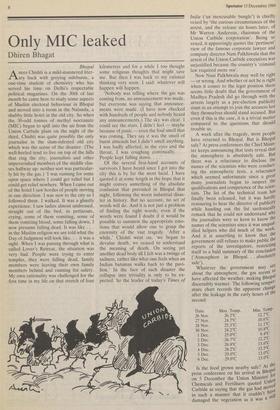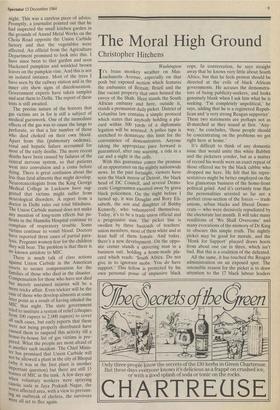Only MIC leaked
Dhiren Bhagat
Bhopal Anees Chishti is a mild-mannered liter- ary hack with greying sideburns, a one-time student of chemistry who has served his time on Delhi's respectable political magazines. On the 30th of last month he came here to study some aspects of Muslim electoral behaviour in Bhopal and moved into a room in the Nalanda, a shabby little hotel in the old city. So when the 30-odd tonnes of methyl isocranate (MIC) began to spill into the air from the Union Carbide plant on the night of the third, Chishti was quite possibly the only journalist in the slum-infested old city which was the scene of the disaster. (The well-heeled tend to live on top of the hills that ring the city, journalists and other impoverished members of the middle clas- ses halfway up: neither sort was particular- ly hit by the gas.) 'I was running for some open space where I could get relief but I could get relief nowhere. When I came out of the hotel I saw hordes of people moving in one direction. I was new to the city so I followed them. I walked. It was a ghastly experience. I saw ladies almost undressed, straight out of the bed, in petticoats, crying, some of them vomiting, some of them vomiting blood, some falling down, I now presume falling dead. It was like . . . in the Muslim religion we are told what the Day of Judgment will look like. . . it was a sight. When I was passing through what is called Lover's Retreat, the situation was very bad. People were trying to enter temples, they were falling dead, family members were leaving their own family members behind and running for safety. My own rationality was challenged for the first time in my life on that stretch of four
kilometres and for a while I too thought some religious thoughts that might save me. But then I was back to my rational thinking very soon. I said: whatever will happen will happen.
'Nobody was telling where the gas was coming from, no announcement was made, but everyone was saying that announce- ments were made. (I have now checked with hundreds of people and nobody heard any announcements.) The sky was clear. I could see the stars. I didn't feel — maybe because of panic — even the foul smell that was coming. They say it was the smell of burnt almonds but I didn't smell anything.
I was badly affected, in the eyes and the throat, I was coughing continually. . . . People kept falling down. . .
Of the several first-hand accounts of survivors I have heard since I got into the city this is by far the most lucid. I have quoted it at some length in the hope that it might convey something of the absolute confusion that prevailed in Bhopal that night, following the worst industrial disas- ter in history. But no account, no set of words will do. And it is not just a problem of finding the right words; even if the words were found I doubt if it would be possible to summon the appropriate emo- tions that would allow one to grasp the enormity of the vast tragedy. 'After a while,' Chishti went on, 'we began to devalue death, we ceased to understand the meaning of death. On seeing yet another dead body all I felt was a twinge of sadness, rather like what one feels when an Indian batsman walks back to the pavi- lion.' In the face of such disaster the collapse into triviality is only to be ex- pected. So the leader of today's Times of India ('an inexcusable bungle') is chiefly vexed by 'the curious circumstances of the arrest, and the release six hours later, of Mr Warren Anderson, chairman of the Union Carbide corporation'. Being so vexed, it approvingly quotes the 'pertinent' view of the famous corporate lawyer and company director Nani Palkhiwala that the arrest of the Union Carbide executives was unjustified because the country's 'criminal law required mens rea'.
Now Nani Palkhiwala may well be right — or wrong. And whether or not he is right when it comes to the legal position there seems little doubt that the government of Madhya Pradesh did go through with the arrests largely as a pre-election publicity stunt in an attempt to join the accusers lest they themselves should stand accused. But even if this is the case, it is a trivial matter compared to the questions that should trouble us.
A week after the tragedy, most people have returned to Bhopal. But is Bhopal safe? At press conferences the Chief Minis- ter keeps announcing that tests reveal that the atmosphere is absolutely safe. But there was a reluctance to disclose the names of the scientists who were conduct- ing the atmospheric tests, a reluctance which seemed unfortunate since a great many journalists began to suspect the qualifications and competence of the scien- tists. The list of the technical team has finally been released, but it was hardlY reassuring to hear the director of publicity while handing out the list sardonicallY remark that he could not understand whY the journalists were so keen to know the names of the scientists since it was unqual" ified helpers who did much of the work. And it is unsettling to know that the government still refuses to make public the reports of the investigators, restricting itself to a bald summary of the conclusion ('Atmosphere in Bhopal. . . absolutelY safe'). Whatever the government may saY about the atmosphere, the gas seems to have affected the weather, making Bhopal discernibly Warmer. The following temPer- ature chart records the apparent change after the leakage in the early hours of the
second: Date Max. Temp.
Min. TemP.
26 Nov. 26.2°C
12.7°C
27 Nov. 24.7°C
10.6°C
28 Nov. 25.3°C
11.1°C
30 Nov. 24.2°C
10.8°C
1 Dec. 25.0°C 9.4°C 2 Dec. 26.7°C
12.2°C
3 Dec. 26.8°C 13.6°C 4 Dec. 28.2°C 12.5°C 5 Dec. 29.0°C
13.0°C
6 Dec. 29.0°C 13.0°C
Is the food grown nearby safe? At the press conference on his arrival in Bhopal on 5 December the Union Minister for Chemicals and Fertilisers quoted Utill Carbide as saying that the gas had move' in such a manner that it couldn't hav.,e, damaged the vegetation as it was a 50"
night. This was a careless piece of advice. Promptly, a journalist pointed out that he had inspected the small kitchen garden in the grounds of Anand Metal Works on the Chola Road opposite the Union Carbide factory and that the vegetables were affected. An official from the Agriculture Department promised to look into this. I have since been to that garden and seen blackened pumpkins and wrinkled brown leaves on the pumpkin vine. And this is not an isolated instance. Most of the trees I have seen by the railway station and in the inner city show signs of discolouration. Government experts have taken samples and sent them to Delhi. The report of these tests is still awaited.
The precise nature of the horrors that gas victims are in for is still a subject of medical guesswork. One of the immediate effects of the gas was to cause the lungs to Perforate, so that a fair number of those Who died choked on their own blood. Apart from this (pulmonary oedema), renal and hepatic failure accounted for most of the early deaths. The more recent deaths have been caused by failures of the central nervous system, so that patients went into convulsion and a coma before dying. There is great confusion about the less than fatal ailments that might develop. Neurotoxicologists from the King George Medical College in Lucknow have sug- gested that victims might suffer from neurological disorders. A report from a doctor in Delhi rules out total blindness. The Union Carbide manual does not make any mention of long-term effects but pa- tients in the Hamidia Hospital continue to complain of respiratory trouble. Some victims continue to vomit blood. Doctors have reported three cases of partial para- lYsis. Pregnant women fear for the children they will bear. The problem is that there is 00 known antidote to MIC.
There is much talk of class actions against Union Carbide in the American courts to secure compensation for the families of those who died in the disaster. ,Compensation for those who have not died °In merely sustained injuries will be a more tricky affair. Even trickier will be the rase of those who develop ailments at some ter point as a result of having inhaled the ITC that night. The state government Ined to institute a system of relief (cheques 'pm 100 rupees to 2,000 rupees) to cover ah such cases, but early reports that these were not being properly distributed have Faused them to suspend this activity till a nouse-by-house list of gas victims is pre- pared. What the people are most afraid of Is another such incident. The Chief Minis- ter has promised that Union Carbide will not be allowed a plant in the city of Bhopal Why it was in the first place is another nportant question) but there are still 15 _tonnes of MIC in the tank. A few days ago _when. voluntary workers were spraying caustic soda in Jaya Prakash Nagar, the orst affected area, with a view to prevent- Lng an outbreak of cholera, the survivors Were all set to flee again.



















































 Previous page
Previous page